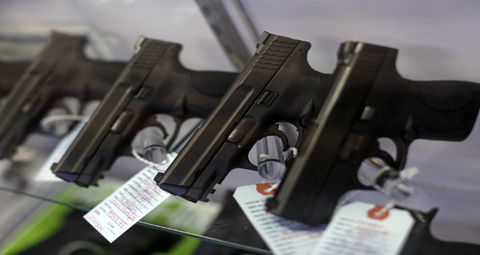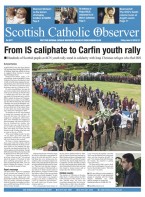June 24 | ![]() 0 COMMENTS
0 COMMENTS ![]() print
print

Being a pacifist in a world of guns
Fr Ronald Rolheiser
The Gospels tell us that after King Herod died, an angel appeared in a dream to Joseph in Egypt, telling him: “Get up! Take the Child and His Mother and go to the land of Israel, for those seeking the Child’s life are now dead.” (Matthew 2, 19-20). The angel, it would seem, spoke prematurely, the Child, the Infant-Christ, was still in danger, is still in danger, is still mortally threatened, and is still being tracked down, right to this day.
God still lies vulnerable and helpless in our world and is forever under attack. All forms of violence, of aggression, of intimidation, of bullying, of ego-parading, of seeking advantage, are still trying to kill the child. And the Child is threatened too in less-overt ways, namely, whenever we turn a blind eye on those who lie helpless and exposed in war, poverty, and economic injustice, we are still killing the Child. Herod may be dead, but he has many friends. The Child is forever threatened.
Many of us are familiar with the story of the Trappist monks in Algeria who were martyred by terrorists in 1996. Some months before being taken captive and executed, they had been visited by the terrorists; ironically on Christmas Eve, just as they were preparing to celebrate the Christmas Eve Eucharist. The terrorists, heavily armed with guns, left after a tense standoff wherein the monks would not agree to give them the medical supplies they were demanding. But the monks, understandably, were badly shaken. What was their response? They went immediately to their chapel and sang the Christmas Mass, putting special emphasis on how Jesus entered this world radically vulnerable and helpless and was immediately under threat. Their measured, eventual response honoured this immediate reaction: Living now under the threat of death, they refused to arm themselves or accept military protection, believing that there was an unbridgeable incongruity between what they had vowed themselves to and the presence of guns inside their monastery. Moreover, after that initial encounter with armed terrorists, their Abbott, Christian de Cherge, introduced a special mantra into his daily prayer: “Disarm me! Lord, disarm me!” Living under the threat of arms, he prayed daily to remain disarmed, physically helpless against potential attack, to be like a newborn child, like the newborn Jesus, exposed and helpless before the threat of violence.
But that’s not an easy thing to imitate, especially since most everything in our world today beckons us towards its opposite, namely, to arm ourselves, to counter every threat, gun for gun, to meet all potential threat with armed resistance. It’s the times: Like Christian de Cherge and his community of monks, we too live under the threat of terrorism and widespread violence. And our paranoia is heightened as, daily, our news reports give us images of terrorist shootings, bombings, beheadings, mass-shooting, street violence, and domestic violence. We live in violent times. Understandably there’s an itch to arm ourselves.
So how realistic is it to refuse to arm ourselves? How realistic is it to pray to be disarmed? Christianity has always defended both justified self-defense and just war. Beyond even this, no prudent society would ever choose to disband its police force and its military and these, necessarily, carry guns and other weapons.
Indeed it might be said that those who argue for radical pacifism can do so only because they are already protected by police and soldiers with guns. It’s not too much of a stretch to say that, except for the guns and weapons that protect us, we all stand helpless before the criminals and psychopaths of this world. But, that needs some nuance.
Among other things, there’s still a powerful case to be made for remaining personally disarmed. The late Cardinal of Chicago, Francis George, argued it this way: We need pacifists in the same way as we need vowed religious celibates, that is, we need Gospel-inspired persons to give a particular, sometimes-singular, witness to what the Gospels ultimately point to, namely, to a place beyond our present imagination, a heaven within which we will relate to each other in an intimacy which we cannot yet imagine and where there will be no arms or weapons. In heaven, we will be utterly defenceless before each other. There will be no guns in heaven.
This reality is already imaged in the newborn Christ, helpless and vulnerable and already so threatened.
It is also imaged in our own modern-day pacifists, from Dorothy Day to Martin Luther King, from Mother Teresa to Christian de Cherge, from Daniel Berrigan to Larry Rosebaugh, we have been gifted by the witness of Gospel-inspired persons who, in the face of physical threat and violence, chose to risk their lives rather than pick up a gun. The times are forcing us too to choose: Do we arm ourselves or not?
Because those seeking the life of the child are still around, paranoid folks, like King Herod, killing indiscriminately for fear that a helpless child might soon threaten their throne and their privilege.
Fr Ronald Rolheiser is a Catholic priest and member of the Missionary Oblates of Mary Immaculate. He is president of the Oblate School of Theology in San Antonio, Texas. Visit his website at www.ronrolheiser.com











